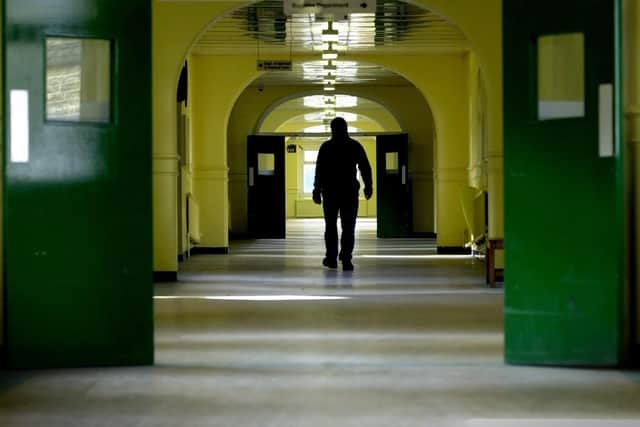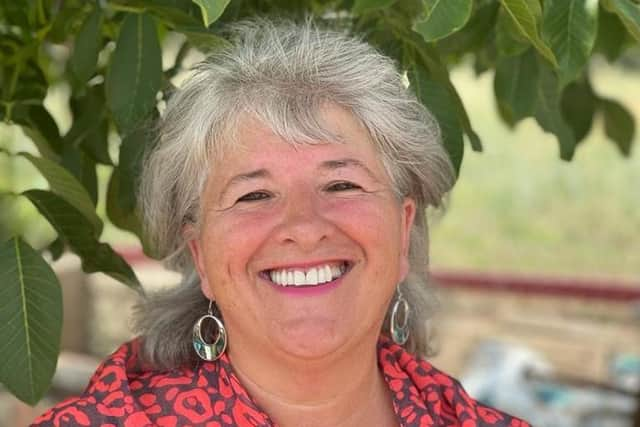Belinda Black's A Place for Lost Souls offers insight into secure mental health hospitals in North of England
She was put on a male rehabilitation ward which housed 45 men of all ages, the vast majority of whom were admitted for their own safety and that of others. It was a baptism of fire and in the early days she hated it. To lift her spirits she would play music on the communal record player with ‘My Favourite Things’, from The Sound of Music, a particular favourite.
Then one day, an elderly Ukrainian man called Olek suddenly got to his feet and started dancing around the room with her. For Belinda, it was an epiphany. “That stopped me being horrified because that’s how I felt when I first went in,” she says. “I realised that people in the hospital were people just like me that happened to have an illness, or shouldn’t have even been there in the first place. I think that was a pivotal moment for me.”
Advertisement
Hide AdAdvertisement
Hide AdIt’s one of many stories, that range from heart wrenching to shocking, in her new memoir A Place for Lost Souls, which recalls her eye-opening experiences at one of Britain’s secure mental hospitals in the 1980s. It also charts the hospital’s closure, along with many others, in the early 90s – part of the biggest overhaul of mental healthcare in NHS history.


Before retiring in 2021, Belinda spent more than 40 years in the mental health sector, during which time she worked as a mental health nurse, helped NICE develop national guidelines for the delivery of health and social care, and became CEO of a social care charity.
She says she wrote the book because she felt the story of the closure of our asylums and the move towards ‘care in the community’ had largely been overlooked. “The mental health nursing that I did then is so different from what takes place now. But when we closed all the asylums we threw the baby out with the bathwater. There were things that were good about the asylums, but I also wanted to show that some practices were horrific and that times have moved on,” she says.
Though the names of places, patients and staff in the book have been changed, out of respect for the individuals, the stories are true.
Advertisement
Hide AdAdvertisement
Hide AdHer mother worked as a psychiatric nurse but Belinda says that wasn’t why she followed in her footsteps. “In our area lots of people worked in the hospital, it was a massive employer. I didn’t have a job and my mother insisted I got one and there were jobs there. I didn’t have a drive or a passion to work in that field.”


However, this quickly grew as she developed an affinity with her patients – people of all ages and all walks of life. “We did have people with serious mental illness but I also cared for two older ladies who’d both been in there because of unmarried pregnancies.”
There were also people who had survived the horrors of concentration camps during the war and those with learning difficulties who ended up in asylums.
“It wasn’t just people with serious mental illness, there was a broad spectrum of people,” she says.
Advertisement
Hide AdAdvertisement
Hide AdSome, like Agatha who was a similar age, even became friends. “I spent more time with her than I did with members of my family because I was there 40 hours a week. I even spent time with her when I wasn’t working, taking her out on trips. So I had a good relationship with her, in particular, because I thought ‘this could me my life locked up here.’”
Belinda says the provision of mental healthcare has changed from when she started.
“Some people were kept in asylums for years who should never set foot over the threshold. But someone with a serious mental illness needs support and guidance and I think that’s absent from our mental healthcare services today. I’m not advocating a return to asylums but I do think people with serious mental illness need much more care and support than they currently get in the mental health system."
These days there is greater awareness of mental health issues, though Belinda points out there’s a difference between mental health and serious mental illness.
Advertisement
Hide AdAdvertisement
Hide Ad“Yes, I think we talk about mental health quite openly, things like anxiety or a depression episode after the death of a loved one, the kind of mental health trials and tribulations that we all have,” she says. “But I still think there’s a bit of a taboo about people with schizophrenia or bipolar disorder, more serious mental illnesses.
“We talk about care in the community but people don’t want people like that living by them, and their behaviour can cause problems. I’m passionate about supporting people with mental illness but I wouldn’t want somebody living next door to me who was regularly disturbed and having mental health crises.”
She believes there needs to be more focus on kindness in care. “In today’s health and social care I think things like kindness and compassion are not discussed as much as they should be. We talk a lot about safety, procedures and training, but if there’s something wrong with you mentally or physically you want to be treated in a kind, caring and compassionate way, and working with patients taught me that.”
It’s something Belinda hopes comes across in her book. “I hope readers see the patients as people and it creates a bit more empathy and understanding about people with mental illness. It’s also a record of that time which doesn’t really seem to exist. It’s such a massive moment in time, with the closure of these asylums, and yet there’s so little written about it.”
A Place for Lost Souls, by Belinda Black, published by Quercus, is out now.